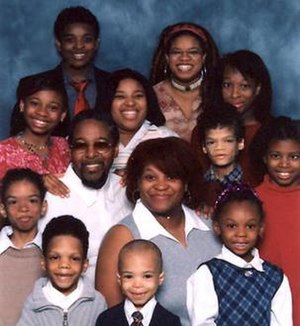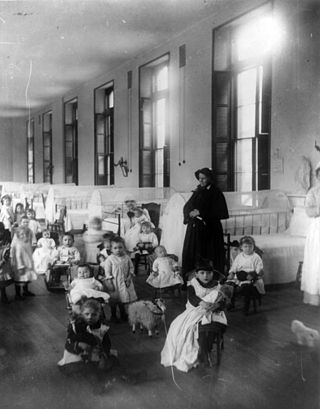
Adoption is a process whereby a person assumes the parenting of another, usually a child, from that person's biological or legal parent or parents. Legal adoptions permanently transfer all rights and responsibilities, along with filiation, from the biological parents to the adoptive parents.

Collingswood is a borough in Camden County, in the U.S. state of New Jersey, located 5 miles (8.0 km) east of Center City Philadelphia. As of the 2020 United States census, the borough's population was 14,186, an increase of 260 (+1.9%) from the 2010 census count of 13,926, which in turn reflected a decline of 400 (−2.8%) from the 14,326 counted in the 2000 census.
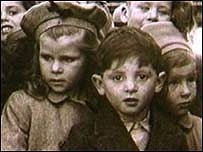
Foster care is a system in which a minor has been placed into a ward, group home, or private home of a state-certified caregiver, referred to as a "foster parent", or with a family member approved by the state. The placement of a "foster child" is normally arranged through the government or a social service agency. The institution, group home, or foster parent is compensated for expenses unless with a family member.
The international adoption of South Korean children started around 1953 as a measure to take care of the large number of mixed children that became orphaned during and after the Korean War. It quickly evolved to include orphaned Korean children. Religious organizations in the United States, Australia, and many Western European nations slowly developed the apparatus that sustained international adoption as a socially integrated system.
An animal rescue group or animal rescue organization is a group dedicated to pet adoption. These groups take abandoned, abused, or stray pets and attempt to find suitable homes for them. Many rescue groups are created by and run by volunteers, who take animals into their homes and care for them—including training, playing, handling medical issues, and solving behavior problems—until a suitable permanent home can be found.

More adoptions occur in California each year than any other state. There is domestic adoption, international adoption, step parent adoption and adult adoption.
In the United States, adoption is the process of creating a legal parent–child relationship between a child and a parent who was not automatically recognized as the child's parent at birth.

Beulah George "Georgia" Tann was an American social worker and child trafficker who operated the Tennessee Children's Home Society, an unlicensed adoption agency in Memphis, Tennessee. Tann used the home as a front for her black market baby adoption scheme from the 1920s to 1950. Young children were kidnapped and then sold to wealthy families, abused, or—in some instances—murdered. A state investigation into numerous cases of adoption fraud led to the institution's closure in 1950. Tann died of cancer before the investigation made its findings public.
Attachment therapy is a pseudoscientific child mental health intervention intended to treat attachment disorders. It is found primarily in the United States, and much of it is centered in about a dozen clinics in Evergreen, Colorado, where Foster Cline, one of the founders, established his clinic in the 1970s.

Raymond Chevalier "Bucky" Waters is an American basketball broadcaster with ESPN and Madison Square Garden Network and a retired basketball coach. He served as head basketball coach at West Virginia University from 1965 to 1969 and at Duke University from 1969 to 1973, compiling a career college basketball coaching record of record of 133–96.

Hotel for Dogs is a 2009 American family comedy film directed by Thor Freudenthal in his directorial debut, and based on the 1971 novel of the same name by Lois Duncan. Starring Jake T. Austin, Emma Roberts, Kyla Pratt, Lisa Kudrow, Kevin Dillon and Don Cheadle, the film tells the story of two orphaned siblings, who secretly take in stray dogs along with their family dog at a vacant hotel.
In re: Gill is a landmark Florida court case that in 2010 ended Florida's 33-year ban on adoptions by homosexuals. In 2007, Frank Martin Gill, an openly gay man, had petitioned the circuit court to adopt two boys that he and his partner had been raising as foster children since 2004. Gill was prohibited from adopting by a 1977 Florida law prohibiting adoption by gay men and lesbians in that state. After a four-day trial challenging the law, on November 25, 2008, Judge Cindy S. Lederman declared the ban violated the equal protection rights of the children and their prospective parents under the Florida Constitution, and granted Gill's adoption request.
The Division of Child Protection and Permanency is New Jersey's child protection agency. It is part of the Department of Children and Families. From 1996 through 2012, it was called Division of Youth and Family Services (DYFS)[DYE-fuss]. Before 1996 It was called Child Protection Services.
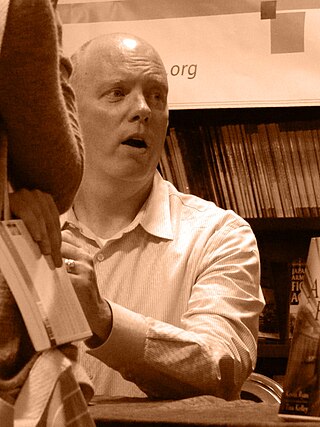
Kevin Ryan, was the president and CEO of Covenant House International, one of the largest charities in North and Central America serving homeless, trafficked and sexually exploited youth.
Child-selling is the practice of selling children, usually by parents, legal guardians, or subsequent custodians, including adoption agencies, orphanages and Mother and Baby Homes. Where the subsequent relationship with the child is essentially non-exploitative, it is usually the case that purpose of child-selling was to permit adoption.
The following outline is provided as an overview of and topical guide to adoption:
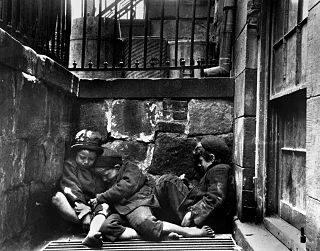
Foster care is the term used for a system in which a minor who has been made a ward or a non-minor, typically aged 18–21, who volunteers for placement, is placed in a relative placement, a non-related extended family (NREFM) placement, a community family home, an institution, or a group home. Relative, NREFM, and community caregivers certified by the state are typically referred to as "foster parents," "kin caregivers," "resource parents," or other local terms. The placement of the child is usually arranged through state or county social services. The institution, group home, or caregiver is reimbursed for the expenses related to caring for the child. The state via the family court and child protection agency stand in loco parentis to the minor, making all legal decisions, while the caregiver is responsible for the day-to-day care of the minor. Even while their child is in Care, typically birth parents retain Education and Medical rights and the right to contact with their child unless parental rights are terminated by the Court.
Nathaniel Craver was a Russian-born boy adopted by a married U.S. couple whose death in their custody sparked a public outcry.

Adoption in the Philippines is a process of granting social, emotional and legal family and kinship membership to an individual from the Philippines, usually a child. It involves a transfer of parental rights and obligations and provides family membership. The Department of Social Welfare and Development (DSWD) defines adoption as a "socio-legal process of giving a permanent family to a child whose parents have voluntarily or involuntarily given up their parental rights."

The Turpin case involved the abuse of children and dependent adults by their biological parents, David and Louise Turpin of Perris, California, U.S. The ages of the 13 victims ranged from 2 to 29 years old. On January 14, 2018, one of the daughters, then-17-year-old Jordan Turpin, escaped and called local police, who then raided the residence and discovered disturbing evidence. Given the number of dependents involved, the degree of abuse, and the protracted nature occurring over decades, the story garnered significant national and international news. Experts in family abuse considered the case to be extraordinary for many reasons.
